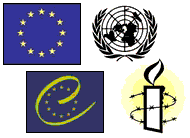Human Rights Watch
Created | Updated Apr 7, 2005

Thailand: All Burmese refugees are to be required to register
into new official camps which will be on the Burmese border. If refugees
fail to register then they will be arrested and deported back to Burma,
this even includes those officially recognized as refugees. Failure to
register will also mean the refugee will no longer receive protection or
assistance from the United Nations High Commissioner for Refugees (UNHCR)
in Thailand, and they will be barred from resettlement abroad. The UNHCR
has protested these plans which will affect 3,000 refugees. It is believed
it is a plan to destroy the Burmese pro-democracy movement.
Once in the camps the refugees will have no access to phones or the
internet, thus they will not be able to communicate if they are concerned
at activities in Burma or in the camps themselves. The UNHCR was only told
on the 9th March about the 31st March deadline,
meaning the refugees are being given very little time to react.
Many Burmese fled Burma after the 1990 crackdown by the Burmese
military on activists, which included the National League for Democracy
(NLD) which had just won the election. Things have been changing though.
Thailand now exports 10,000 migrants a month back to Burma, many of whom
then suffer ill-treatment at the hands of Burmese officials. These are
called 'informal deportations'. There are also around 400 illegal migrants
deported each month directly back to military holding centres.
In May 2004 there was a peaceful protest held outside the Burmese
embassy to commemorate the fourteenth anniversary of the 1990 Burmese
election won by the NLD. 34 people were arrested including a 3 year-old
child. They were going to be deported to Burma but the Thai government
backed down after international pressure. It is hoped that the same
international pressure will help now.
Ivory Coast: The government of the Ivory Coast has been
recruiting hundreds of demobilized soldiers from Liberia, including
children under 18. This is in spite of holding peace talks with the
northern-based rebels on Sunday 3rd April. The African
Union-led peace initiative will be lead by the South African President
Thabo Mbeki, Pretoria.
The prosecutor of the International Criminal Court announced on
20th January that he would be sending a team to investigate war
crimes including the use of children under 15, which is a war crime.
Combatants who had fought there were enticed with offers of payment, more
if they brought others, or of being allowed to pay themselves through
looting.
Other news in brief: The President of the Palestinian Authority
has announced the resumption of execution of prisoners on death row.
In Uganda information has been removed about HIV/AIDS from
primary school material. Secondary school materials state that latex
condoms have microscopic pores in them which let through HIV. They also
say that pre-marital sex is a form of deviance. Government sponsored
rallies spread similar information. One head teacher has said that
abstinence doesn't work as girls are selling themselves just to buy
bread.
The UN Security Council have passed a resolution to refer Darfur
to the International Criminal Court. Exemptions to please the US mean that
non-Sudanese from countries not party to the ICC cannot be prosecuted
though.
A peaceful post-election prayer meeting in Zimbabwe was broken
up with violence and the arrest of 250 women.
In Rio de Janeiro a 'Death Squad' killed at least 30 people.
Previous killings like this were carried out by corrupt police
officers.
A military court in Greece has allowed a conscientious objector
to apply for alternative civilian service instead, for religious
reasons.
Tibet To keep up-to-date with the human rights issues in Tibet
please refer to Tibet News by John–the-gardener.
Information and Links

